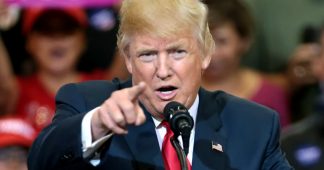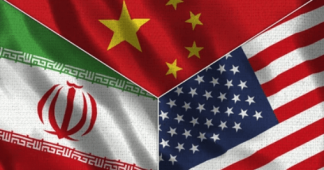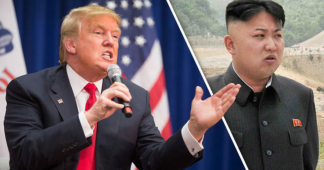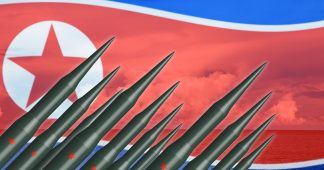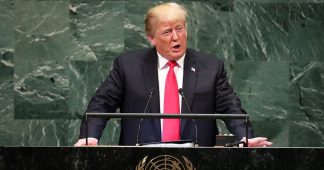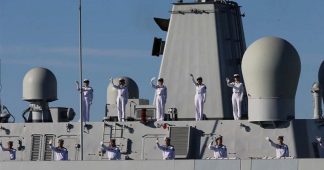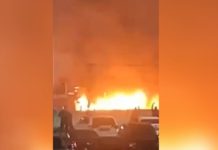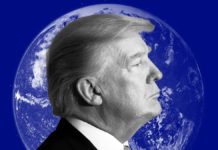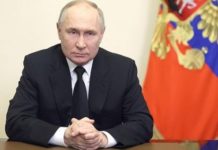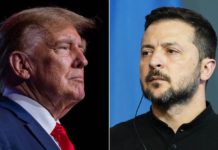By Julian Borger
Donald Trump has threatened to “totally destroy” North Korea, in a bellicose first address to the United Nations general assembly in which he lashed out at a litany of US adversaries and called on “righteous” countries to confront them.
The speech was greeted in the UN chamber mostly with silence and occasional outbreaks of disapproving murmurs, as Trump castigated a succession of hostile regimes.
In an address heavy with echoes of George W Bush’s “Axis of Evil” State of the Union address more than 15 years earlier, Trump said: “The scourge of our planet today are a small group of rogue regimes.“If the righteous many do not confront the wicked few, then evil will triumph,” the president said.
He first singled out North Korea, recounting its history of kidnapping, oppression, and missile and nuclear tests.
“The US has great strength and patience,” Trump said. But he added: “If it is forced to defend ourselves or our allies, we will have no choice but to totally destroy North Korea.”
As alarmed murmurs spread around the hall, Trump had another barb. Using his newly adopted epithet for Kim Jong-un, Trump said: “Rocket Man is on a suicide mission for himself and for his regime.”
He said the US was “ready, willing and able” to take military action, but said hopefully that would be unnecessary if the rest of the world stepped up its efforts to constrain the Pyongyang regime.
“That is what the United Nations is for,” the president said. “Let’s see how they do.”
Trump moved on to Iran, claiming that the Islamic Republic had robbed a great people of its destiny.
“The entire world understands that the good people of Iran want change and, other than the vast military power of the United States, that Iran’s people are what their leaders fear the most,” he said, adding that the day would come when the Iranian people would be faced with a choice between “the path of poverty, bloodshed and terror” and their country’s “proud roots as a center of civilisation, culture, and wealth”.
Trump said the Iran nuclear deal, signed by the US under the Obama administration with five other countries two years ago, was “one of the worst and most one-sided transactions the United States has ever entered into”.
“Frankly, that deal is an embarrassment to the United States,” he said. “I don’t think you’ve heard the last of it – believe me.”
Trump must decide by 15 October on whether to certify Iranian compliance or not. His threatened withdrawal of presidential endorsement could lead to Congress reimposing nuclear-related sanctions and the collapse of the agreement.
Like much of the 41-minute speech, Trump’s reference to the Iran deal was met by stony silence. The deal is overwhelmingly supported by UN member states, including most of Washington’s closest allies.
The French president, Emmanuel Macron, also making his UN debut, said he had offered to discuss further constraints on Iranian missile development and curbs on Tehran’s nuclear programme after 2025, when important elements of the 2015 deal expire. But Macron warned that if the existing deal was abandoned it would lead only to a “no man’s land”, a nuclear arms race and a situation as serious as the North Korean crisis.
The Iranian foreign minister, Mohammad Javad Zarif, responded with a tweet, saying Trump’s “ignorant hate speech belongs in medieval times – not the 21st Century UN” and adding that it was “unworthy of a reply”. “Fake empathy for Iranians fools no one,” he said.
The Israeli prime minister, Benjamin Netanyahu, was one of the few to applaud when the US president said the world could not abide by the Iran agreement “if it provides cover for the eventual construction of a nuclear programme”.
Netanyahu swiftly issued a statement praising Trump. “In over 30 years in my experience with the UN, I never heard a bolder or more courageous speech,” Netanyahu said. “President Trump spoke the truth about the great dangers facing our world and issued a powerful call to confront them in order to ensure the future of humanity.”
Trump is also almost entirely isolated on climate change. Unlike the other opening speakers, including the UN secretary general, António Guterres, Trump made no mention in his speech of an issue that most other leaders in the chamber consider to be the greatest threat to the world.
When his turn to speak came, Macron insisted that though the Paris climate accord, which Trump said he would leave, could be improved, “it will not be renegotiated”. He said he “profoundly respected” the US decision but said “the door will always be open to them”.
The US president had clearly not come to the UN in the mood to placate foreign leaders, but rather to speak over their heads to his own supporters.
He picked out one adversary after another, pointing out that he had taken steps to reverse Barack Obama’s policy of detente with Cuba. But he devoted much more of his speech to a rigorous denunciation of the government of Nicolás Maduro, which he said was strangling Venezuela through “faithfully implemented” socialism.
Trump vowed to help the Venezuelan people “regain their freedom, recover their country and restore their democracy”.
The US has already imposed severe sanctions on the Maduro government and Trump said Washington was ready to take “further action” if the regime “persists on its path to impose authoritarian rule”.
The Venezuelan foreign minister, Jorge Arreaza, said Trump’s remarks were “sad for the world” and said the US president had spoken like a general at the head of an invading army.
“We do not accept threats from President Trump or whoever in the world,” Arreaza said. “We are … peaceful people and we want relations of mutual respect.”
Maduro, who did not attend the UN gathering, reacted angrily from Caracas, calling the US president’s speech an “aggression from the new Hitler of international politics, Mr Donald Trump, against the people of Venezuela”.
Attacks on other governments took up much of the second half of Trump’s speech. The first half was devoted to outlining his view of international relations, which he repeatedly said should be based on “strong sovereign nations” with different cultures and values.
Trump’s argument against humanitarian intervention and “nation-building” is an approach favoured by Russia, China and much of the Non-Aligned Movement.
“As president of the United States,” he said, “I will put America first, just as you as leaders of your countries will always put your countries first.”
It was one of the few lines that drew significant applause. Trump did not explain how that sentiment squared with the second part of his address, in which he called for action against “rogue regimes” for their lack of democracy.
Published at www.theguardian.com
We remind our readers that publication of articles on our site does not mean that we agree with what is written. Our policy is to publish anything which we consider of interest, so as to assist our readers in forming their opinions. Sometimes we even publish articles with which we totally disagree, since we believe it is important for our readers to be informed on as wide a spectrum of views as possible.
